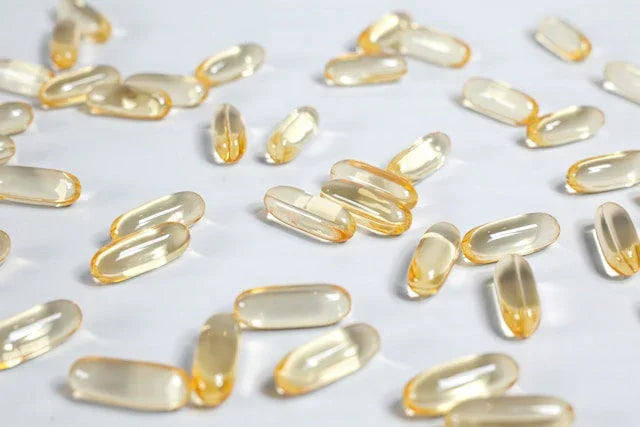
Don't take fish oil from a capsule!
No one really questions the overall health benefits of omega-3 fatty acids anymore. But more important is this: where do they come from? Why does origin matter? How do you get maximum benefit? Our view is clear: eat plenty of fresh, fatty fish!
The well-known omega-3 fatty acids EPA and DHA are found in marine food sources. There are now countless articles describing the actions of these special fats.
Eating fresh, fatty fish is best because, in addition to intact omega-3s, you also get a complete package of other nutrients. Fresh beats processed — and that also applies to supplements!
“When fish oil is processed and refined, the oil becomes less stable and more prone to spoilage.”
Position shift due to processing
Natural omega-3-rich foods like fatty fish work better than fish oil capsules because they’re absorbed optimally. One reason is the position of omega-3 fatty acids on the glycerol backbone. There are three positions: sn-1, sn-2, and sn-3. In food sources like fatty fish, they are predominantly in the middle, at the sn-2 position.
When fish oil is processed and refined, much of the sn-2 content shifts to the sn-1 or sn-3 positions. This shift makes the oil less stable and more susceptible to rancidity. The shift of DHA to the outer positions also affects bioavailability. Compared with sn-2 omega-3s, fish oil is less digestible, less absorbable, and less active in the central nervous system (the brain).
Fresh fatty fish is therefore preferred above all — ideally two to three times per week. Unfortunately, we often don’t manage that. If you can’t eat fish that often, supplements are a good solution. But choose the best alternatives! Krill oil, Calanus oil, and Extra Virgin cod liver oil are, in our view, the best options and also complement each other very well.
Fish oil
Capsule fish oil is a highly refined product. As a result, it works less well — consider the sn-2 position of DHA, the greater tendency to spoil, and the absence of the evolutionary package of (micro)nutrients and co-factors. Various literature also points to potential contamination.
Calanus oil and krill oil
A further point is the lack of phospholipids in fish oil. DHA and EPA are not water-soluble and therefore cannot be transported in free form through the blood. They need to be “packaged,” for example with phospholipid-containing lipoproteins. Krill oil is rich in phospholipids.
It works similarly to fish oil but with higher effectiveness — about 60% more effective. In addition, both Calanus oil and krill oil are rich in astaxanthin, a natural antioxidant that protects omega-3s from oxidation. Quality is maintained and shelf life is greatly extended.
The specific wax esters in Calanus oil (plankton oil)
Calanus oil is a relatively new player. It is characterized by the presence of wax esters — very long fatty-acid chains that are digested differently from the ethyl esters and triglycerides found in, for example, fish oil. Whereas krill oil enables rapid and effective uptake, the wax esters in Calanus oil, in a positive way, do the opposite: during digestion, the free fatty acids are released further down the gut — in the distal small intestine and in the colon. These segments are richest in receptors that respond to these free fatty acids: the fatty-acid sensors GPR120 / FFA4 (G-protein-coupled receptors). Exactly there — where fatty acids from other sources rarely arrive — these fatty acids can do their work!
For both Calanus oil and krill oil, the source is small crustaceans low on the food chain, meaning there is little to no toxin accumulation.
Extra Virgin cod liver oil
The last supplement in our toolkit is “Extra Virgin cod liver oil.” No chemicals, solvents, or other mechanical methods are used during production. The cod is processed cold, leaving the oil unrefined, extra virgin, and highly nutritious. The end product is pure and contains only the bioactive nutrients that naturally occur in cod liver — a one-to-one reflection of the nutritional value of the liver in a living cod.
Each cod is wild-caught from the Atlantic Ocean off the Norwegian coast. The cod liver oil contains a broad spectrum of nutrients, such as vitamins A and D3 and omega-3, -4, -6, -7, -9, and -11 fatty acids.
Of course, this supplement does not meet the best advice we can give: eating fresh, fatty fish three times a week. But as the saying goes, “If you want the fish, you have to handle the bones.” The alternatives we’ve discussed come very close. They complement each other very well or can be used in a rotating cycle. Make the most of it and stay healthy — like a fish in water!


